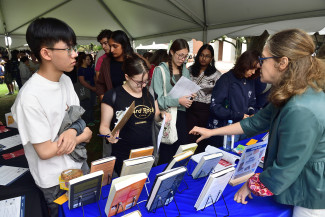
Johns Hopkins UniversityEst. 1876
America’s First Research University
Embracing Open Access and Revisiting a Scholar’s First Books

![]()
Being committed to open access publishing of scholarly works by salaried faculty and having chosen to have five books published in the last decade or so with a pioneering British open access publisher, I am delighted that the Johns Hopkins University Press, the nation’s oldest scholarly publishing house, is moving into this up-to-date, promising field and I am honored that my own earliest publications have been selected for its new open access series. I am particularly pleased because for many of my eighteen intellectually stimulating years teaching at JHU I served on the editorial board of the Press and enjoyed the confidence and friendship of its then-director, the unforgettable Jack Goellner.
The two books of mine that have been selected for republication in the new series could not be more different. The earlier, Men and Masks, on the seventeenth-century French playwright Molière, reflects the influence of the charismatic René Girard, then an associate professor in the Department of Romance Languages. An early advocate of what came to be broadly termed post-modernism, René despised “positivist” scholarship and historical, contextual, and traditional philosophical approaches to literary texts. As a result, my book, the writing of which involved somehow coming to terms with earlier influences, notably Sartre and Lukács (i.e. existentialism and Marxism), contains not a single reference to the work of earlier scholars, notably H. Carrington Lancaster, my distinguished Hopkins predecessor in the field of seventeenth-century French literature. I am now not very proud of this, to say the least, since I have come to think of scholarship as, above all, an evolving, collective enterprise. Nevertheless, at the time, the book was widely and favourably received as a breath of fresh air and as opening up the study of French classical literature to new approaches and ideas. The chapter on Le Misanthrope was translated into German for the volume on Molière in the well-established series Wege der Forschung (1980) and as recently as 2001 Harold Bloom included the chapter on Tartuffe in the volume of Bloom’s Major Dramatists devoted to Molière.

Medievalism and the Ideologies of the Enlightement is focused on the innovative and little-known research into the culture of the French Middle Ages by an eighteenth-century scholar by no means untouched by the ideas of the Enlightenment (and, incidentally, on the work on medieval history and the practice of historiography in general by members of the hardly less-neglected French Académie des Inscriptions). It could not have been more different from Men and Masks. It was based on significant archival and historical research in Paris and in Sainte-Palaye’s native Burgundy as well as on old and rare texts. Essentially, it was a revised and enhanced version of my D.Phil. thesis, directed by the well-known eighteenth-century scholar Jean Seznec, at Oxford University. I took the material up again in an effort to free myself from what I had come to see as the arbitrary and self-centered practice seductively represented by Girard (who was too generous to hold it against me!). It turned out to be a harbinger of things to come. I had been keenly interested in historiography since my graduate student days. As a literary scholar, I long believed the literary aspect of historical texts had been sorely neglected in favor of positivist and, at best, philosophical approaches. At some point I met Haydn White—sadly deceased not long ago—and, as young scholars starting out, we immediately bonded thanks to our shared emphasis on the historical text as a literary artefact. Again I had to wean myself away from this view, which I came to find increasingly confined and confining. (Again Haydn was too generous to hold my defection against me and we remained good friends.) I think it may well have been reflecting on my earlier book on La Curne de Sainte-Palaye that helped me, together, obviously, with other readings, to develop the view I still hold—namely that historiography is a collective research-based enterprise, constantly subject to revision in the light of new questions, new discoveries, new data, new ideas and insights, and—not least—the criticism of informed colleagues. That is where I still stand today, at age 90.
Lionel Gossman is the M. Taylor Pyne Professor of Romance Languages and Literatures, Emeritus, at Princeton University and the author of over a dozen books, beginning with Men and Masks: A Study of Molière in 1963, in addition to several edited and translated volumes.
View over 100 Open Access books from JHU Press at this link. Discover more about the project at our Open Access landing page.


